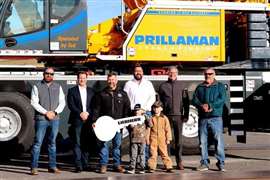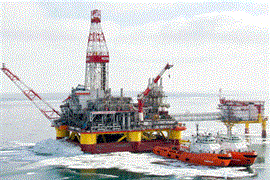SC&RA supports proposed cranes and derricks safety rule
17 April 2009
Joel Dandrea, executive vice president of the Specialized Carriers & Rigging Association (SC&RA), has advocated the proposed safety rule on cranes and derricks in construction during testimony before the US Occupational Safety and Health Administration (OSHA).
"SC&RA members regularly tackle some of the most daunting and dangerous challenges covered by the proposed cranes and derricks standard under consideration today," said Dandrea. "Our association has long been an enthusiastic supporter of efforts to update this important standard. It has not been revised since 1971 and no longer affords the protection workers in our industry need - and deserve."
Dandrea shared panel time with Doug Williams, president of Buckner Cranes in North Carolina, who addressed many of the priorities in the proposed standard, based on practical considerations of the crane and rigging industry. Williams was SC&RA's official representative on a 23-member panel of experts from all facets of the industry appointed by OSHA in July 2003 to develop a recommended proposal for the standard. OSHA instructed these members of the Cranes and Derricks Negotiated Rulemaking Advisory Committee, C-DAC, to negotiate all aspects of a new standard within one year. C-DAC met nearly every month to achieve it. More than four and a half years later and the rules are still awaited.
"In the meantime, our industry has been under attack, largely because of several high-profile incidents involving tower cranes last year," said Dandrea. "We believe provisions agreed to by C-DAC could have prevented fatalities, injuries and property damage."
Dandrea commended OSHA for drafting the proposed standard for expanding and improving safety procedures in a number of significant areas, including tower cranes, derricks, wire rope, hoisting personnel, multiple crane lifts, overhead cranes and gantries, and design reconstruction and testing. He also cited the introduction of new protections in areas not addressed by the existing standard, including qualifications for operators and signalpersons, inspection criteria, fall protection, power-line safety, ground conditions, authority to stop operations, and operational aids.
Dandrea countered testimony from other groups opposing operator certification even though that requirement would impose an additional expense for many SC&RA member companies. "Our members share the conviction that training and certification not be considered an additional cost but rather an investment in safety and our workforce," he said.
He also singled out the importance of provisions in the proposed standard that impose more stringent requirements when working around power lines, noting that power-line contact continues to be the number one killer in the industry.
"The proposed standard clearly and concisely combines all the information companies need to ensure crane and derrick safety," said Dandrea. "Unlike the existing standard, it eliminates the need to scramble for additional references from other sources."
Including all the information in a single, comprehensive volume would be particularly attractive to smaller companies that lack the staff dedicated to researching, cataloguing and interpreting multiple sources, according to Dandrea. Similarly, the recent trend of local and state jurisdictions cobbling together their own guidelines because of the lack of viable federal standards unnecessarily complicates compliance for those working in multiple jurisdictions, he warned.
"We see no reason why a hodgepodge of safety requirements should leave workers in one state more susceptible to worksite injury, or even death, than those in another," said Dandrea.
Dandrea emphasised that clear, concise safety regulations were especially important as the US embarks on an ambitious economic plan which will depend on cranes and derricks in the lifting and shifting of components in building and repairing roads, bridges, the electrical grid and the wind- and solar-generated power sources that will increasingly feed into that grid.
"As our nation rebuilds, the tragedy of any fatalities resulting from faulty regulations would be magnified," said Dandrea. "The progress of much-needed projects would be slowed as America would pause to question their human costs."
To see this article in full see: http://scranet.informz.net/scranet/archives/archive_483492.html
IC is the official international magazine of the SC&RA.


